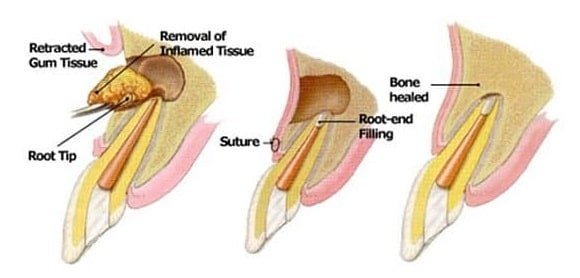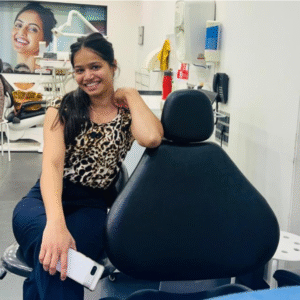Advanced Procedure In Root Canal Treatment At Perfect Dental® In Jamnagar
We perform Apicoectomy procedure in cases where conventional Root Canal Treatment (RCT) fails or the patient has long term untreated periapical abscess (chronic)


Apicoectomy, also known as root end surgery, retrograde root canal treatment or root end filling, is an endodontic surgical procedure whereby a tooth’s root tip is removed and a root end cavity is prepared and filled with a biocompatible material. It is an example of a periradicular surgery.
The root end is filled in order to eliminate any chances of reinfection in future. Apicoectomy is recommended in cases of inaccessible canals, overfilled canals, fractured root, draining sinus tract, broken instrument and cyst or granuloma formation.
Persisting pain in a previously root canal treated tooth may be indicative of re-infection or an unsuccessful root canal procedure. Sometimes there may also be chances of cystic formation in infected region. Usually a second root canal treatment is considered before performing apicoectomy in an attempt to eradicate the recurrent infection. Failure to curb infection may cause it to spread and can damage the adjoining teeth or an underlying bone. Therefore it is imperative to cease the spread of infection at the grass root level through apicoectomy procedure.
Perfect Dental® is best dental clinic in Jamnagar, having highly skilled Endodontist and Oral Surgeon who perform this endodontic surgery with utmost precision. In order to completely remove any chances of reinfection, our best dentists in Jamnagar provide the option of laser application at Perfect Dental®.
– Bleeding is profuse (choking on blood).
– Bleeding is continuous (still changing bright red gauze after 24 hours).
– Severe pain not well controlled by medications.
– Rash, hives or difficulty breathing after taking the medications that suggest an allergic reactions.
– Persistent fever lasting more than 24 hours.
– Discharge coming out from the surgical site.Apicoectomy surgery is usually performed under local anesthesia such as a numbing shot, so you won’t feel any pain. Most apicoectomies take about 30 to 90 minutes to complete. Following the procedure, you may experience some swelling and soreness in the area that was treated.
Infection and debris can quickly affect adjacent teeth. Narrow or curved root canals possess a challenge for your dentist in performing a proper root canal treatment. When the root canal is poorly shaped, the endodontic files cannot reach the root tip and continuing infection or re-infection can result. In such cases, our best dentists in Jamnagar at Perfect Dental® can try to save the tooth with re-treatment or apicoectomy with highly sophisticated instruments and deliver best results.
Perfect Dental® has highly sophisticate equipment for performing advanced root canal treatment (RCT) procedure in Jamnagar. Our doctors are highly experienced specialist dentists for root canal treatment (RCT) in Jamnagar. We like challenges and we have consistently delivered highest success rate in most complex cases of root canal treatment (RCT) for years.
The success rate of traditional apicoectomy was reported to be 59.0% (Setzer et al., 2010).
Following your apicoectomy, you should closely monitor your teeth and gums for signs of treatment failure or infection. If your pain worsens, swelling increases, or you notice signs of infection like sores on the gums, inflammation, or fever, please contact us at Perfect Dental®.
For most people a tooth restored during a root canal could last a lifetime, as long as they continue to care for their teeth and gums. This treatment can typically be done by our best dentists in Jamnagar and they may take x-rays in order to find all the root canals within the tooth.
With modern techniques and anesthetics, most patients report that they are completely comfortable during the procedure. You will remain awake during the procedure and will receive a local anesthesia at the site of the tooth in question. The tooth can feel sensitive for the first few days after the procedure.
Yes, after apicoectomy the cavity in bone is filled with blood clot, which gradually forms a new bone. In some cases where the cavity formed during apicoectomy was too large, our best dentists in Jamnagar at Perfect Dental® may decide to place bone graft to correct the defect and deliver high success rate.
Perfect Dental® is the best dental clinic in Jamnagar and our team of specialist doctors is highly skilled and experienced best dentists in Jamnagar. We have a highest success rate of 97%.

Dr. Chandani
Doctor
Dr. Chandani
Hey, how can I help you today?
Powered by Elementor